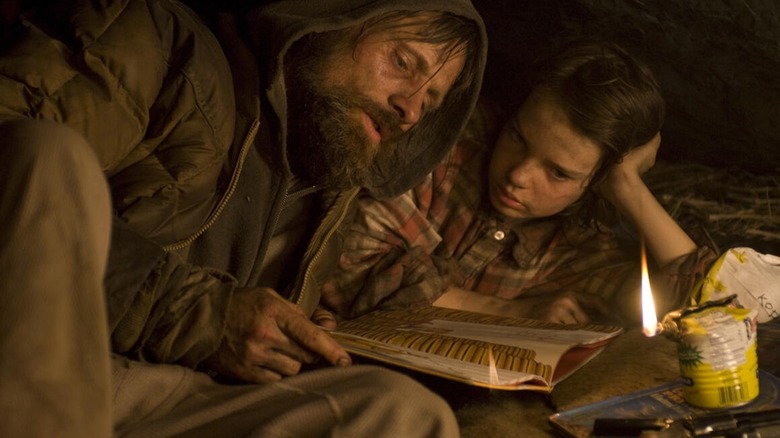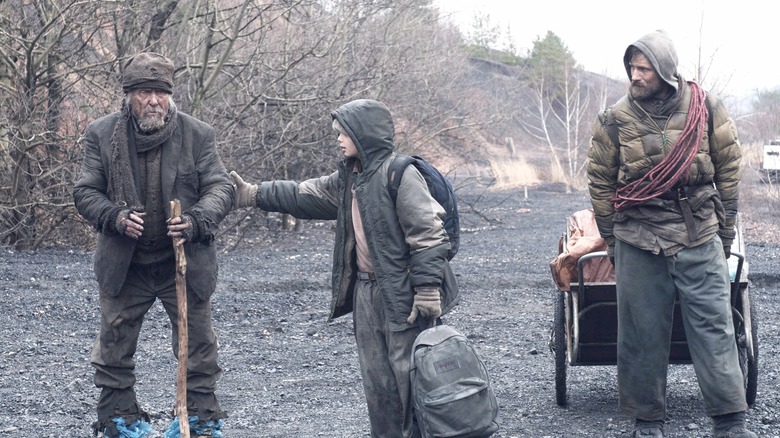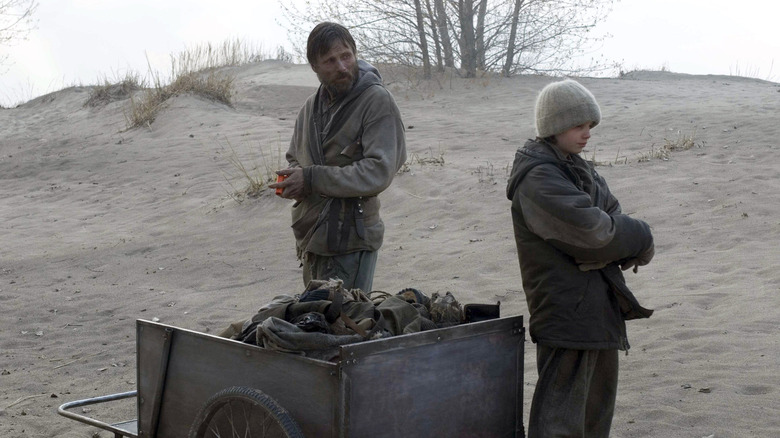Director John Hillcoat Wasn't Interested In Explaining What Led To The World Of The Road
Cormac McCarthy's 2006 novel "The Road" is enough to rip out the heart of any stalwart, adult reader. It is about an unnamed man and an unnamed boy, wandering down a long straight road in a post-apocalyptic world. The plants have died, as have most of the animals. The landscape is crawling with vicious cannibals. This is the twilight of Earth. Man and boy can do nothing but survive. They salvage food. There is no goal to their wandering. They only can care of each other; each being the other's entire world. The boy did once have a mother, but she abandoned them after the Man used one of their three remaining bullets on an attacking intruder. Outraged that the three would not be able to take their own lives together, she wandered away. Viggo Mortensen plays the Man, and a 12-year-old Kodi Smit-McPhee plays the Boy.
"Bleak" doesn't begin to describe McCarthy's novel, nor John Hillcoat's 2009 film adaptation of it. It is a story of life on the wane, a story about despair and survival. It's only by looking at one another that Man and Boy find meaning. Hillcoat's film takes place in a world without color. Many of the individual humans are still alive, but not so you'd notice it. Those who have turned to cannibalism have been driven mad by the repeated consumption of human flesh. When Man and Boy find a rare store of preserved food — Cheetos and the like — they have to remind themselves how to pray to God for thanks.
McCarthy's novel never specified what happened to the world to wipe it out. Hillcoat, in adapting it, likewise kept the apocalypse vague. In a 2009 interview with Today, Hillcoat clarified that the apocalypse was never part of the conversation during production.
What's wrong with the world?
Hillcoat points out, rather logically, that for survivors, the actual details of the world ending are going to be largely irrelevant from a practical standpoint. Does it matter that it was a nuclear bomb? Or a rampant disease? Or a natural disaster? Thematically, a human-made apocalypse would lend itself to a story of hubris and the recklessness of our species, but that hubris will be meaningless to a man and his child looking for food.
"After the event, it's irrelevant because it's so much about the here and now and day-to-day survival from that point on. The past is gone and that's not where your focus is. The spectacle, I think, of the big event, also tends to diminish the human dimension."
What's important is the survival and the desperation. This was a ploy used a few years prior by Michael Haneke in his 2003 film "Time of the Wolf." It really doesn't matter what the cataclysm is when humanity, stripped bare, is all that remains. Mortensen, also interviewed by Today, agrees with this ethos. He sees the stakes of survival were too high in "The Road" to fixate on the "big picture." If the world is ending, he says, everything becomes much smaller. In his words:
"It's inherently dramatic. When you put characters in ... those are movies I've always liked my whole life, even as a kid, to see. Movies where the stakes are high, where characters are really up against it. Then you see what they're made of. Is there grace under pressure, or do they crumble? Once there's no Internet and no phone and no TV and no radio, your world is going to shrink. It's going to be your town, then it's going to be your block, then your house, and your campsite."
The appeal of the apocalypse
When looking over the genre, one will find that post-apocalypse movies tend to function primarily as cautionary tales. When McCarthy's novel was released, some critics immediately saw it as a metaphor for climate change. Having read the novel, this author can see "The Road" as an elegy for humanity, a sad poem for a species that has shed its ability — and its need — to care for the world at large. It is a treatise as to what might happen to our minds when anything frivolous — work, social lives, technology, education — is stripped away. All that remains is an instinctual need to care for those close to us. And, as seen in the cannibals, even that has seemingly died out.
When it comes to films like, say, "I Am Legend" or "Planet of the Apes," the actual explanation for the world's end is explicitly stated. As usual, it was hubris as the culprit. The death of humanity is a modern Tower of Babel story, the world being punished for daring to wield the power of God. Zombie apocalypse movies have more in common with "The Road," as they — very generally speaking — tend to focus on the behavior of the survivors rather than correcting the zombie plague. When our systems are stripped away, what remains of us? Far too often, post-apocalypse movies feature vindicated survivalists, glad to have been paranoid and gun-happy in the years leading up to Armageddon. Now that the world is over, said survivalists have their dreams fulfilled.
"The Road," in contrast, is no trite "Lord of the Wasteland" fantasy. It's a work of lamentation. And when lamenting, it doesn't quite matter what caused the death. The time would better be spent mourning.


